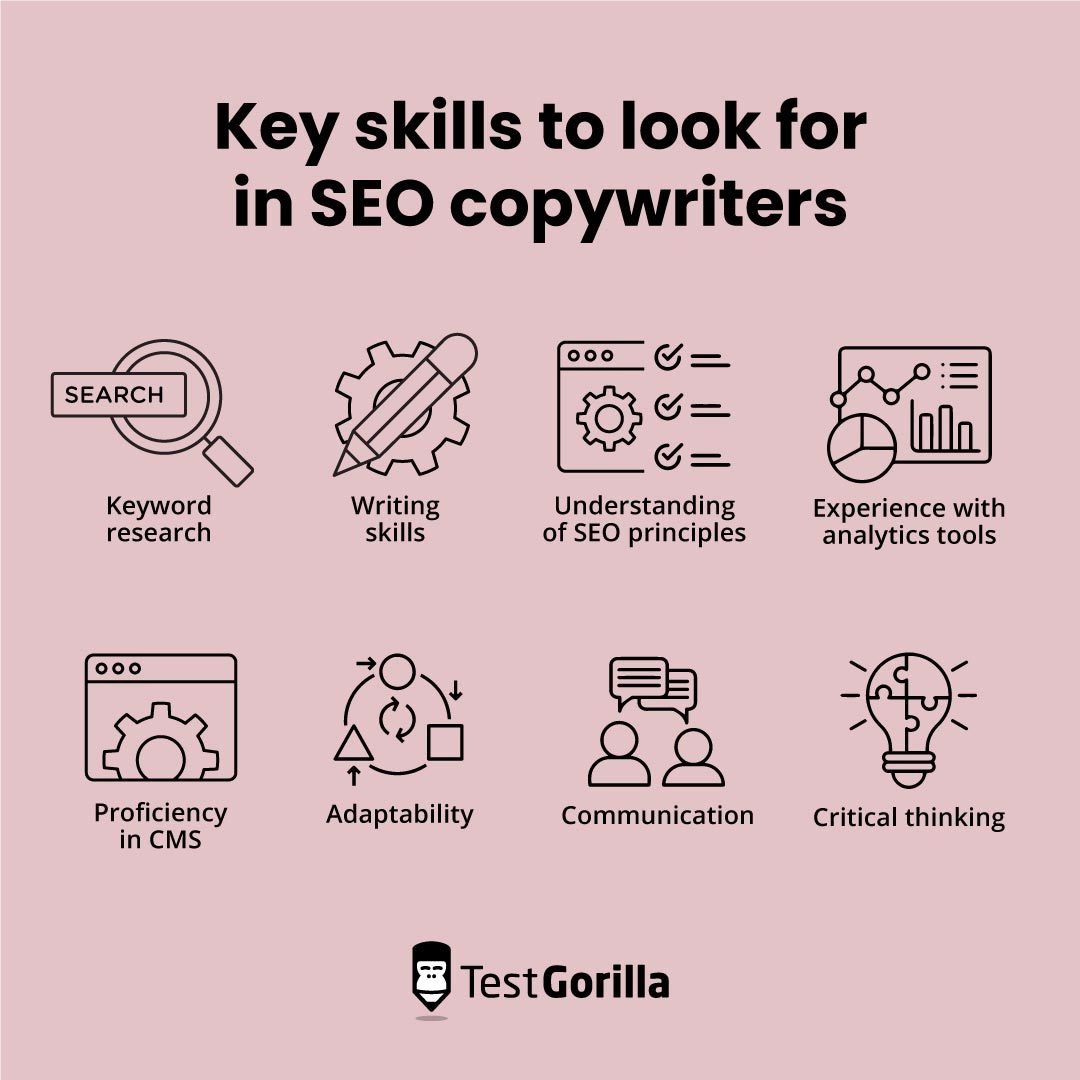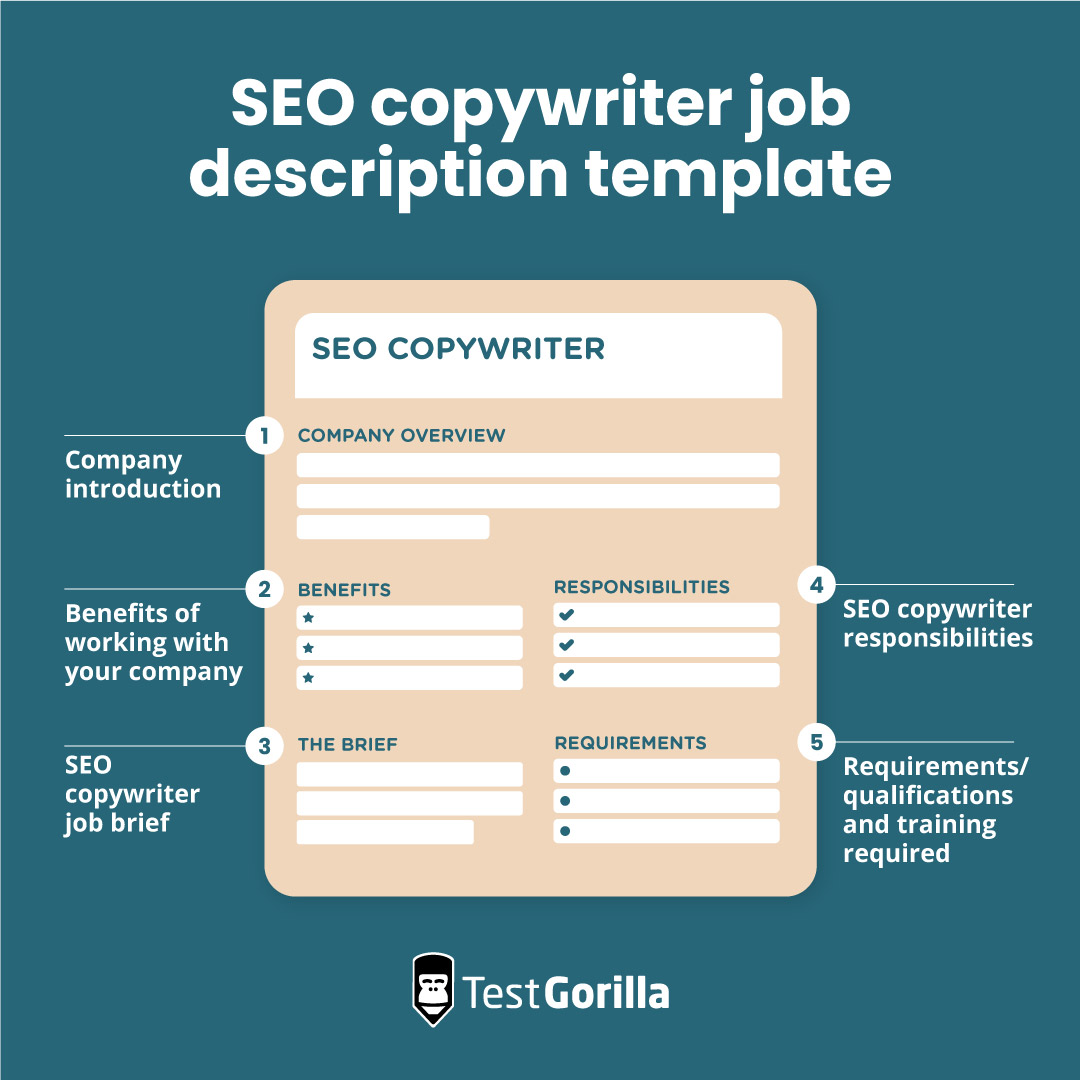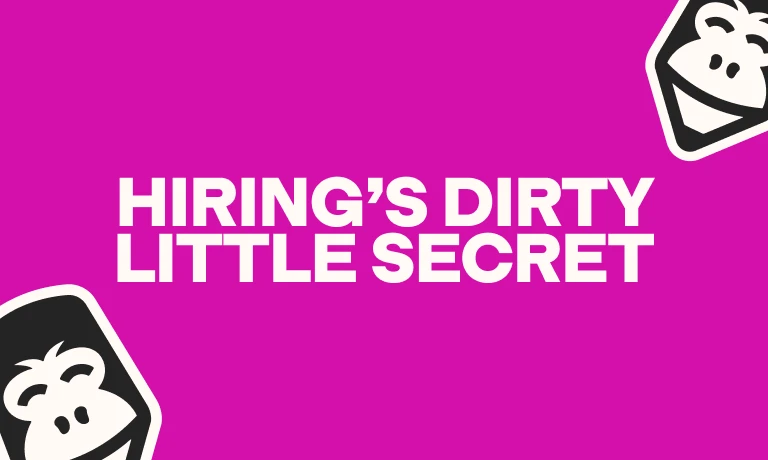Great SEO copywriters help your business grow by creating content optimized to rank higher in search engine results, attracting visitors and converting them into leads or customers. The first step in hiring an SEO copywriter is writing a solid job description to attract top talent.
However, many organizations struggle to write great SEO copywriter job descriptions because they don’t know which skills are most important for the role or how to communicate their workplace culture successfully. Knowing how to do this is essential because poor job descriptions can deter skilled SEO copywriters and attract under-qualified candidates, putting you at risk of making a mis-hire.
That’s why we’re here to help. Below, we’ll show you how to write an effective SEO copywriter job description, assess quality candidates, and more.
Table of contents
- What is an SEO copywriter?
- Key skills to look for in SEO copywriters
- How to write an effective SEO copywriter job description
- SEO copywriter job description template
- 3 things to avoid when writing a job description for SEO copywriters
- Next steps: Attracting and assessing SEO copywriter candidates
- FAQs
- Start hiring skilled SEO copywriters with TestGorilla
What is an SEO copywriter?
In a nutshell, SEO copywriters create valuable, engaging content optimized for search engines.
They do this by conducting keyword research, integrating keywords and links into content, and adhering to SEO best practices. SEO copywriters aim for their content to rank highly on search engine results pages (SERPs) and appeal to readers, encouraging more traffic to the site.
Key skills to look for in SEO copywriters
Great SEO copywriters will possess these hard and soft skills:
Keyword research: Proficiency in identifying and using keywords in writing so the content ranks higher in search results
Writing skills: Creating clear, engaging content by balancing audience appeal with SEO needs
Understanding of SEO principles: A solid grasp of current SEO best practices and algorithm changes to keep content optimized
Experience with analytics tools: Using tools like Google Analytics and SEMrush to evaluate content success, refine tactics, and drive improvement
Proficiency in content management systems (CMS): Experience using platforms like WordPress or Drupal to optimize, format, and publish content
Adaptability: Staying informed of changing search engine algorithms and swiftly adjusting content strategies in response
Communication: Writing engaging and coherent content, being receptive to feedback, and collaborating with team members and clients
Critical thinking: Analyzing search data, evaluating content effectiveness, and devising strategies that address evolving user needs and search engine algorithms
The best insights on HR and recruitment, delivered to your inbox.
Biweekly updates. No spam. Unsubscribe any time.
How to write an effective SEO copywriter job description
Here are three important points to remember when writing an SEO copywriter job description:
Cover hard and soft skills
SEO copywriters need hard skills like SEO analytics but also soft skills, such as attention to detail and communication, for accurate content and team collaboration. Ensure your job description includes the hard and soft skills essential for the role.
A skills-based job description will attract applicants with a well-rounded skill set, giving you a better chance of finding the perfect hire. It also gives you a clear set of criteria to evaluate candidates’ capabilities and spotlight areas for upskilling new hires, like emerging SEO trends or advanced data analysis.
Clearly explain what the role entails
To avoid hiring the wrong SEO copywriter, clearly outline the role’s responsibilities and expectations. Clarify daily tasks, such as keyword research and article writing, so potential candidates know what to expect in their day-to-day role if hired.
Likewise, comprehensive job descriptions ensure applicants have a precise understanding of their responsibilities and allow them to evaluate their suitability for the position. This clarity also reduces potential misunderstandings about the role and streamlines the onboarding process for new hires.
Highlight your company’s culture
A job description is a perfect place to describe your company culture. By highlighting your organization’s core values, mission, and vision, you give potential candidates a sense of what it’s like to work with you so they can see themselves as part of your team.
SEO copywriters, in particular, are often drawn to environments where they can craft fresh content that stands out from competitors, builds trust with readers, and helps improve people’s lives by helping them solve problems.
In your job description, emphasize your company’s values that will resonate with them, like innovation, authenticity, and transparency.
SEO copywriter job description template
Here’s a template to help you craft great job descriptions for your SEO copywriter roles.
Company introduction
Begin with a brief overview of your company's values, main areas of business, and mission. Note how and when your company was formed, and share its key achievements. In addition, highlight how SEO copywriting has contributed to your company’s growth.
Benefits of working with [your company]
Here, list the advantages of working within your organization. These might include competitive compensation and benefits, flexible work options, and professional development opportunities.
SEO copywriter job brief
[Company name]
Job title: [For example, Senior SEO Copywriter or Junior SEO Copywriter]
Reports to: [For instance, SEO Manager or Content Director]
Position type: [Full-time, part-time, on-site, remote, or hybrid]
[Salary and benefits details]
SEO copywriter responsibilities
Research and integrate targeted keywords and long-tail phrases into web content
Ensure on-page optimization by crafting meta titles, meta descriptions, and header tags that are compelling, adhere to character length limits, and include targeted keywords
Work with the SEO team to produce link-worthy content, aiding in backlink acquisition strategies to boost domain authority and ranking
Use Google Analytics to evaluate content performance, assessing metrics like organic traffic, bounce rate, and conversion rate
Continuously learn and adapt to the latest SEO trends, updates, and best practices
SEO copywriter requirements/qualifications and training required
Bachelor’s degree in marketing, journalism, English, or a related field – OR equivalent work experience
Minimum of 2 years of experience in SEO copywriting
Professional certification in Google Analytics is a plus
3 things to avoid when writing a job description for SEO copywriters
Avoid these three pitfalls when creating your SEO copywriter job descriptions.
1. Using vague language
Avoid using ambiguous terms or jargon that can confuse potential applicants. Instead, be precise about the responsibilities, expectations, and qualifications required for the role. This way, you can attract individuals with the skills and abilities needed to succeed in your organization.
2. Overloading with requirements
Avoid listing an excessive number of "must-have" qualifications that aren't truly essential to your role. This can deter potentially great candidates who might be missing just one or two of the listed qualifications.
3. Including biased or exclusionary terms
Refrain from using terms that might be gender-specific, age-related, or culturally insensitive, as these can alienate potential applicants.
For example, instead of using a biased phrase like “young and energetic” use a more inclusive one, like “dynamic and motivated.” Also, instead of noting that you’re seeking a “native English speaker,” use the inclusive alternative “fluent English speaker.”
Next steps: Attracting and assessing SEO copywriter candidates
After you’ve created a well-written job description, start posting it on job boards and social media platforms to maximize visibility.
When you have a sizable applicant pool, it’s time to narrow it down to your top candidates so you can hire the best copywriter for your business.
You can do this by using TestGorilla’s multi-measure assessments that enable you to evaluate candidates’ SEO copywriting skills, personality types, and more. Mix and match up to five tests for a custom assessment that gives you a 360-degree view of each candidate.
For example, pairing our SEO Copywriting Skills test with the DISC Personality test will give you insights into candidates' role-specific competencies and the motivations behind their workplace behaviors.
TestGorilla’s extensive library also offers numerous tests to assess copywriters in areas like reading comprehension, culture add, and problem-solving. Plus, you can add custom questions to any TestGorilla assessment for even more insights into candidates' capabilities. For ideas on what to ask, check out our list of 50 copywriter interview questions.
FAQs
How often should you update the job description for an SEO copywriter?
Review and potentially update your job description at least once a year or following significant shifts in SEO practices and tools. Doing so will help ensure you always attract candidates with the latest skills and knowledge in the ever-evolving SEO landscape.
What is SEO copywriting vs. copywriting?
SEO copywriting focuses on creating content optimized for search engines, while general copywriting involves crafting persuasive and engaging text without necessarily targeting search engine algorithms.
Start hiring skilled SEO copywriters with TestGorilla
Hiring a skilled SEO copywriter enables your company to enhance its online visibility, drive organic traffic, and effectively engage with a wider audience.
To kick off your recruitment process, write a detailed SEO copywriter job description that outlines your expectations and highlights the benefits of joining your organization.
Then, once you fill your applicant pool, use TestGorilla’s scientifically backed pre-employment assessments – including specific tests for copywriters – to evaluate candidates’ skills and find the best person for your role.
Start your hiring journey today by signing up for a free TestGorilla plan.
You've scrolled this far
Why not try TestGorilla for free, and see what happens when you put skills first.




















